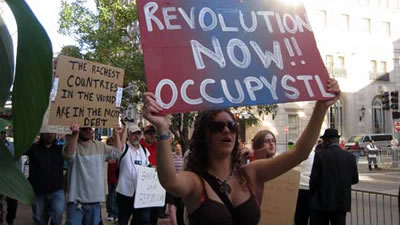Green Party (US)
How Cuba mobilises to defeat public health emergencies

Medical students in Cuba.
Photo essay: World Food Day protest at Monsanto's world headquarters
.jpg)
Photos by Don Fitz and Barbara Chicherio
October 17, 2011 -- Links International Journal of Socialist Renewal -- It ain’t easy organising anti-Monsanto pickets in St. Louis, where it seems that every other person has a relative, neighbour or friend who works for the corporate demon and is worried about its retaliation. Nevertheless, the Gateway Green Alliance and Safe Food Action St. Louis planned a demonstration as part of the October 16, 2011, World Food Day and Millions Against Monsanto nationwide events put together by the Organic Consumers Association.
Several dozen activists fighting the company’s efforts to force GMOs (genetically modified organisms) on everyone who eats food, as well as its attempt to destroy small farmers in the US and across the globe, met at the Monsanto's world headquarters on the afternoon of October 16. Soon we were joined by a couple of carloads from Occupy St. Louis and had a lively group of 50.
A big problem with picketing Monsanto’s headquarters is that Olive Boulavard traffic whizzes by at 40–50 miles per hour, meaning that drivers can’t read a sign with small or thin letters. But several of us remembered the old Burma Shave signs on two-lane highways.These are photos of the picket.
Revolutionary health care in Cuba and Venezuela: Beyond Western 'sickness-based' medicine

Monthly Review Press has kindly given permission
Why does health care in Cuba cost 96% less than in the US?

Claudia Lopez, an intern, with outpatients at 5 de Septiembre Polyclinic, Havana.
Cuba: Reversing the medical `brain drain’ – the many faces of ELAM

ELAM students.
By Don Fitz, Havana
Barry Sheppard reviews Peter Camejo's `North Star -- A Memoir'
North Star – A Memoir
The false promise of energy efficiency and a real alternative

By Don Fitz
August 22, 2009 -- An action can have opposite effects, depending on it s social contexts. An isolated individual who protests company policy by refusing to go to work could well get fired and become an example used to intimidate others. When an entire workforce stays off the job, it’s called a “strike” and has a very good chance of forcing the company to change its policy.
As positive as they may be for friends and family, individual lifestyles of non-violence do not stop wars from being fought. But a society that eliminates corporate control of the economy gets rid of the need for expansion and takes an enormous step towards non-violence. In this context, non-violent lifestyles solidify non-violent global politics.
It is even more so with “energy efficiency”. It is impossible for individual choices to purchase energy-efficient products to have any positive effect on climate change. But, in a democratically run economy, energy efficiency would be a cornerstone of resolving the catastrophic legacy of production for profit.
United States: Industry-backed opponents of healthcare reform react with racism, violence

By Don Fitz
August 14, 2009 -- St. Louis -- Did you hear about the town hall meeting in St. Louis on August 6, where union thugs attacked a black conservative and sent him to the hospital with multiple injuries? Well, it didn’t happen exactly like that. In fact, events were the opposite of what talk show hosts Rush Limbaugh and Bill O’Reilly broadcast and what the corporate media relayed across the US.
The right-wing Tea Party group announced to the world that their supporter Kenneth Gladney was assaulted by Elston McCowan, who is an organiser for the Service Employees International Union (SEIU). Earlier this year I worked closely with McCowan, a black minister, when he ran for mayor of St. Louis on the Green Party ticket. Since nothing that I heard fit the McCowan I know, I interviewed him about the August 6 incident.
What’s wrong with a 30-hour work week?

By Don Fitz
May 30, 2009 -- With millions of jobs lost during the first part of 2009, who is calling for a shorter work week to spread the work around? Not the Republicans. Not even the Democrats. But why is there nary a peep from unions?
In the US, the vehicle industry sets the pace for organised labour. The only discussion at the top levels of the United Auto Workers Union (UAW) is how quickly the gains won during the last 50 years can be given back. Does the UAW have no memory of the 1930s and 1940s when a shorter work week was at centre of organising demands?
The gross domestic product is plummeting at the same time that jobs are disappearing. Why should there be any connection between the two? If society produces 10% less, why don’t we all just work 10% less? Didn’t things work like that for hundreds of thousands of years of human existence? When people figured out easier ways to get what they needed, they spent less time doing it.
A Green's view of Cuba: Reflections on the 50th anniversary of the revolution

By Barbara Chicherio
During January 2009 I visited Cuba over a long weekend. My stepdaughter started medical school there this past August and this was the first chance in several months for her Dad and me to see her. Visiting Rebecca was wonderful, but I was unprepared for what I encountered during the three short days spent in Cuba and how the experience would shift my perception of the global economy.


